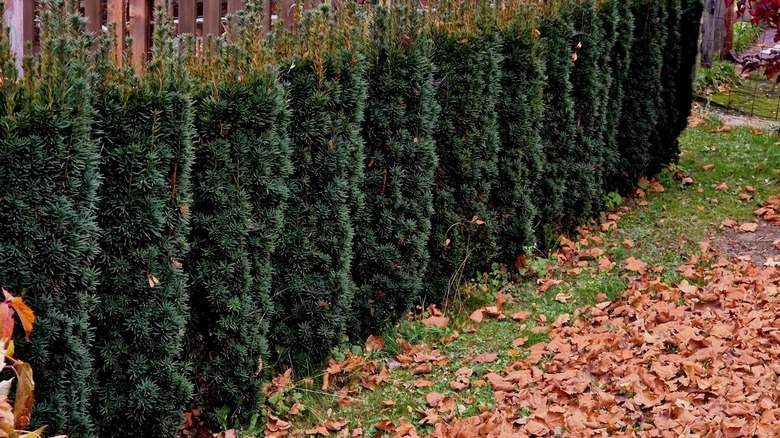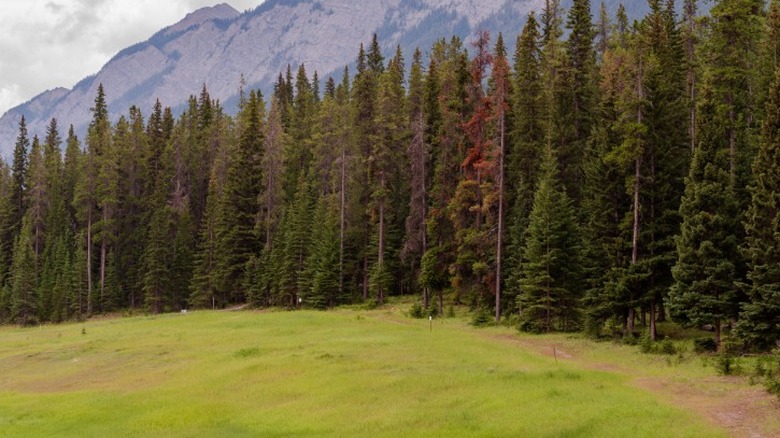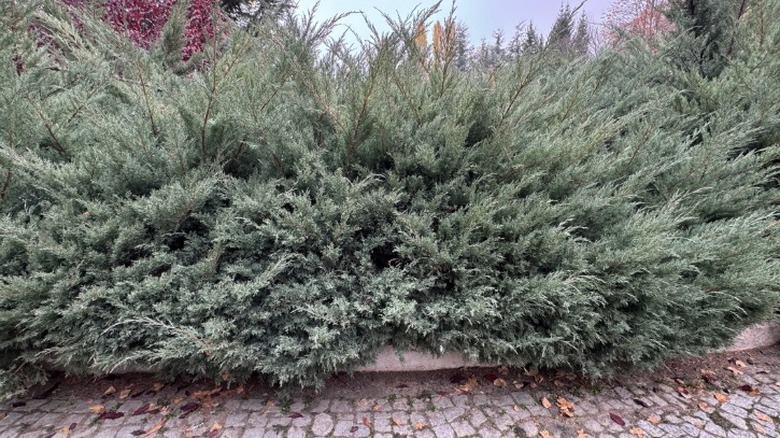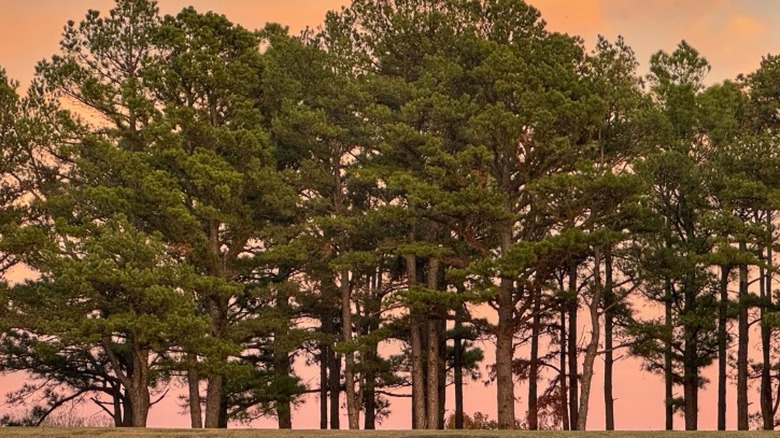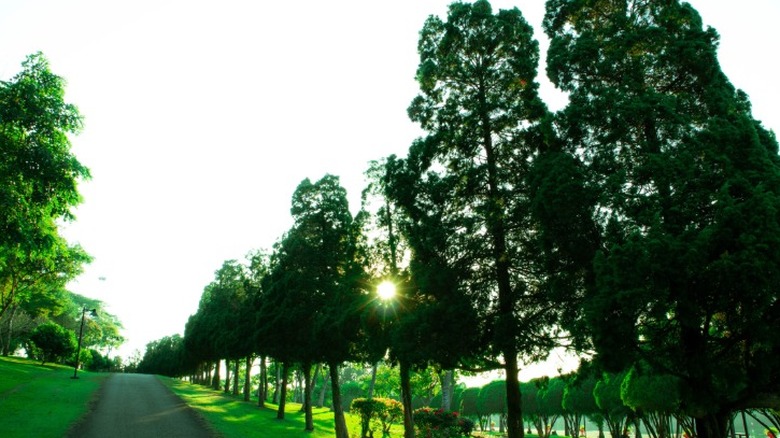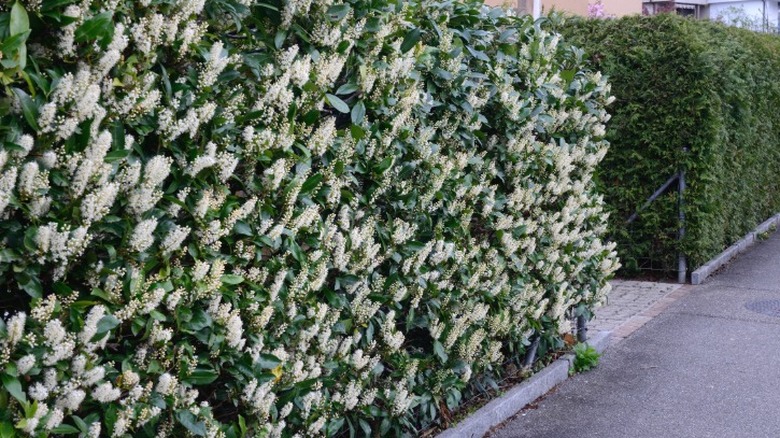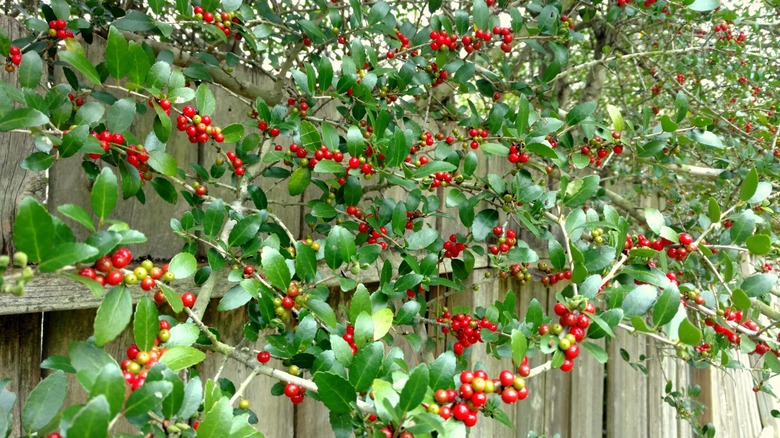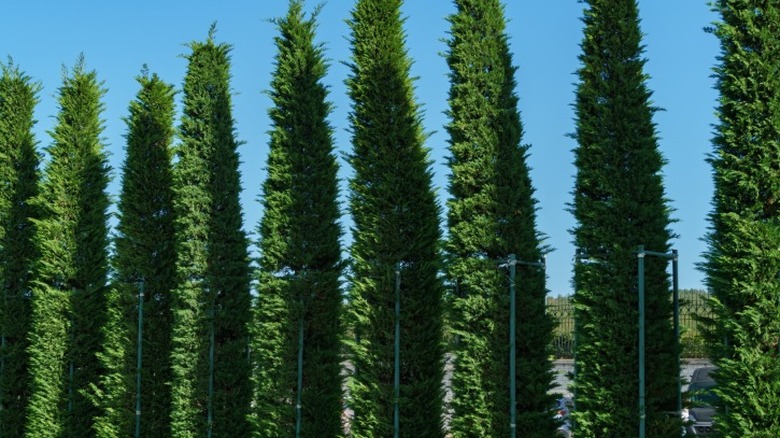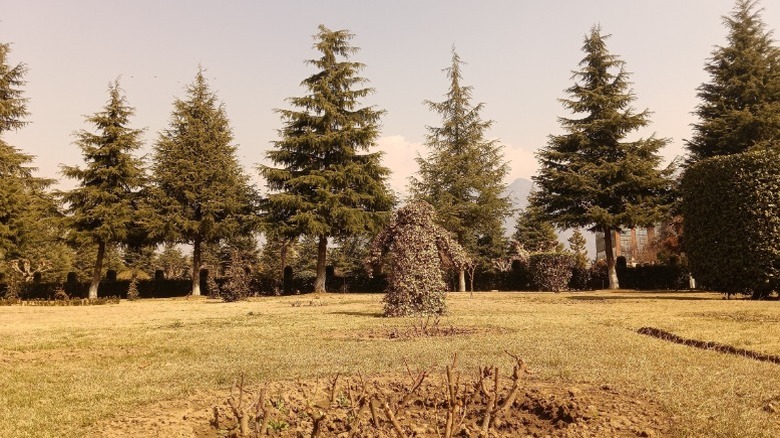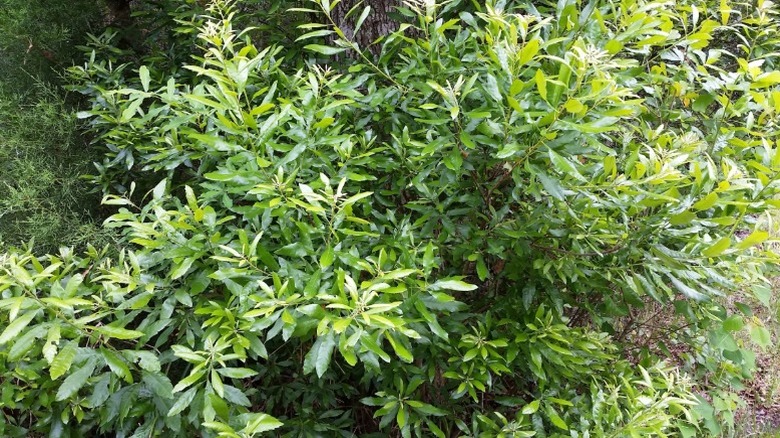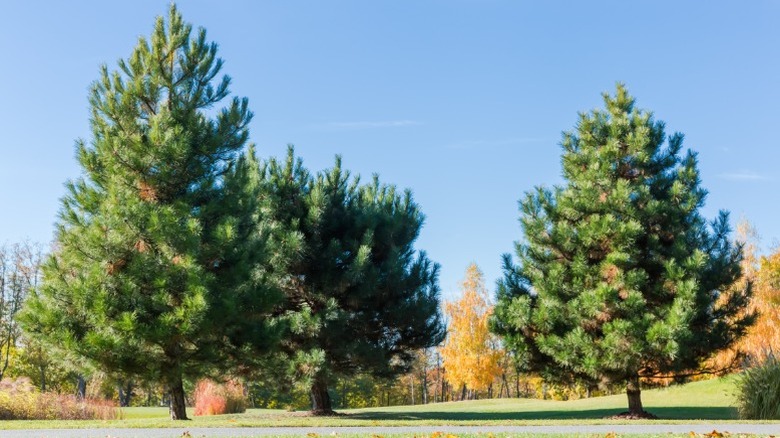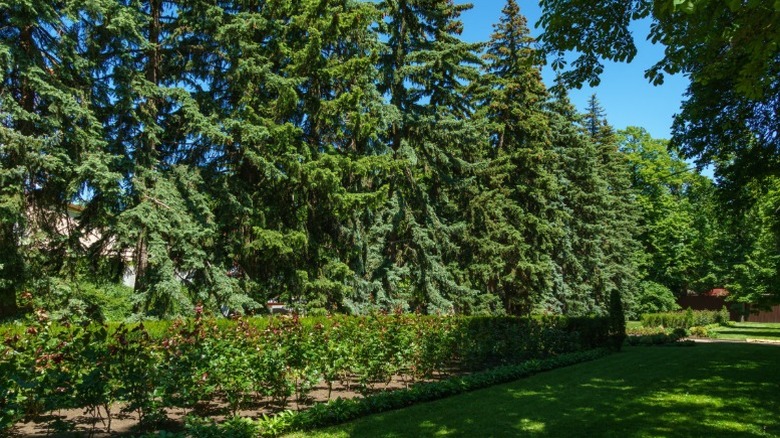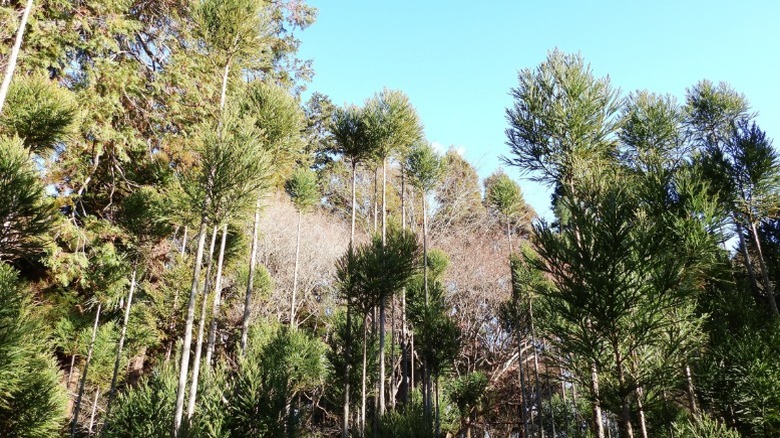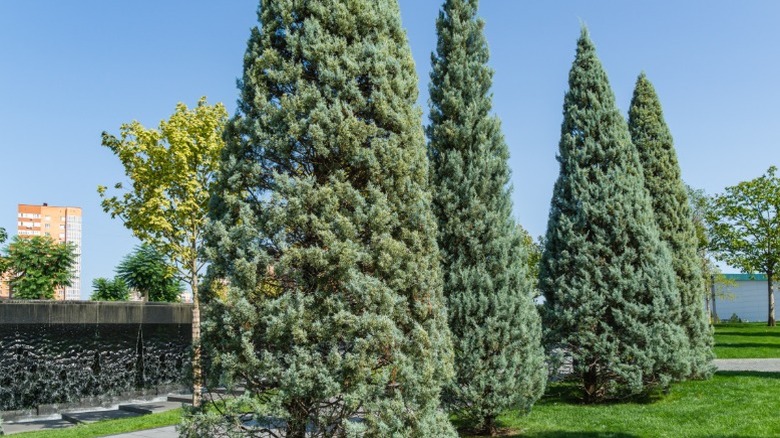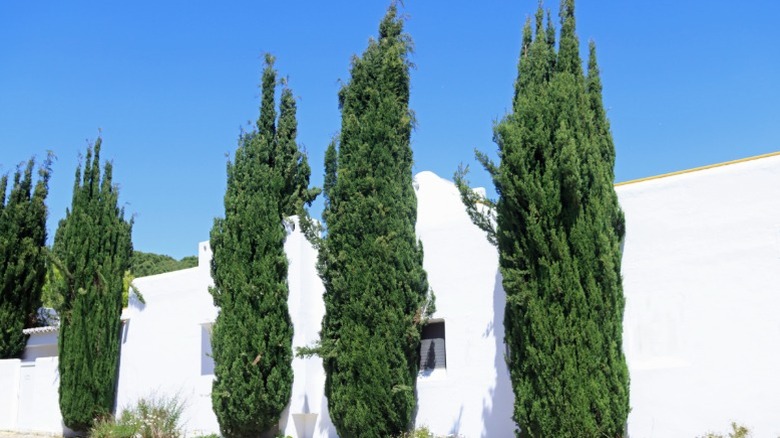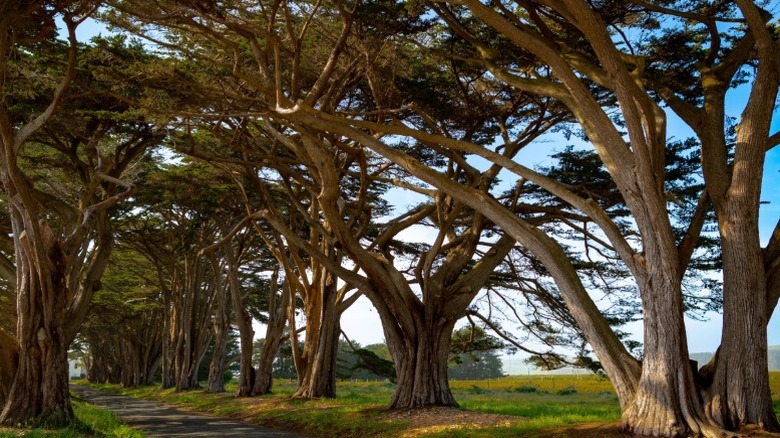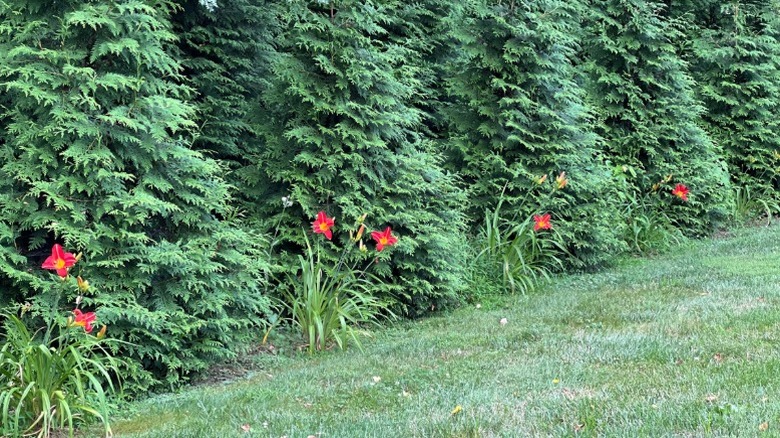16 Fast Growing Privacy Trees You Can Enjoy Year-Round For Their Looks And Security
While fences can be attractive, they can also be expensive and create a feeling of being enclosed in your yard. Instead of building a fence to add privacy and security to your property, you can try growing attractive trees to create organic seclusion. The best trees to use as living privacy screens or hedges are evergreen trees, whether they are needle-leaf or broadleaf. Not only are evergreen trees beautiful choices to have in your landscaping, but there are many adaptable options that form natural walls to limit your outdoor space's visibility. Careful pruning and attention to your trees can help you feel secure on your property all year round.
If you're seeking fast-growing trees to plant for privacy in your yard, consider evergreen options like loblolly pines (Pinus taeda) or grand firs (Abies grandis) that exhibit quick growth and grow well when planted in groups. Broadleaf evergreens, like wax myrtle (Myrica cerifera) and yaupon holly (Ilex vomitoria), also add lovely flowers and fruits to your landscape, along with excellent, dense foliage. Selecting trees that grow more rapidly can provide your lawn with a hedge or screen more efficiently than trees that take many years to mature to full coverage.
Select a sturdy Douglas fir for dependable privacy
Not a true fir despite its name, the evergreen Douglas fir (Pseudotsuga menziesii) is a large species that can grow between 80 and 200 feet tall in the wild. Cultivated varieties are a little bit more manageable, topping out at 40 to 60 feet. Douglas firs form an attractive pyramidal shape, starting out at moderate growth. But growth can take off after a few years, particularly in well-suited climates. Hardy from zones 4 through 6, trees prefer slightly acidic and well-drained soil. Douglas firs make great large-scale screen trees for the landscape.
Try an adaptable species like eastern red cedar
If you're in the market for a dependable tree to grow as a privacy screen or windbreak, look no further than the eastern red cedar (Juniperus Virginiana). This evergreen, with its various shades of green and moderate to fast growth rate, is very tolerant and adaptable to adverse conditions. For example, eastern red cedar is both heat and cold tolerant, with hardiness from zones 2 through 9. Native to the northern and eastern U.S., red cedars are a beautiful, long-lived species that can be a great investment as a screen or privacy tree.
For a privacy screen fast, grow loblolly pine trees
The loblolly pine (Pinus taeda) is a pine tree you should grow in your yard if you need a fast-growing privacy screen species. In just one year, a single tree can grow 3 feet, maxing out at 125 feet tall. Native to the southeastern U.S., loblolly pines can be identified by its pretty dark green needles in bunches. Plant loblolly pines where they'll receive full sun. Although you should prioritize well-draining soil with average moisture, this pine species tolerates wet soil conditions and is hardy in zones 6 through 9.
Add a popular Christmas tree species for privacy
One of the tallest firs you can plant in your yard, the grand fir (Abies grandis) is native to the Pacific Northwest and hardy in zones 4 through 6. This species exhibits rapid growth, making it ideal for creating quick cover. It also has a refreshing fragrance, reminiscent of the holidays. In fact, grand firs are commonly grown as Christmas trees. This tree's large stature, ranging from 150 to 200 feet at maturity, means it is only well-suited to large, spacious properties. Mature fir trees develop thick foliage with symmetrical branches.
Create a pretty screen with the lovely cherry laurel
While there are two broadleaf evergreen trees with the epithet cherry laurel, the Carolina cherry laurel (Prunus caroliniana) is native to the southern U.S. and grows even taller than the European native. With a light cherry fragrance to the leaves when crushed, it is a pleasant tree to have in a landscape, although mind that children and pets stay away from its poisonous parts. Carefully prune a stand of cherry laurels to form a dense screen of glossy foliage, providing privacy year-round. Fast-growing cherry laurels are hardy from zones 7 through 10.
Plant a native holly tree with beautiful berries
If you want a tree to plant for privacy in a small backyard, consider the fast-growing yaupon holly (Ilex vomitoria), a species native to the U.S. and Mexico. The attractive bright green leaves, traditionally used for ceremonial tea by indigenous peoples, have a leathery feel. A broadleaf evergreen, yaupon holly trees feature red berries from fall to winter that attract birds. What makes it a good privacy tree is its dense growth and adaptability to different areas as an attractive barrier or hedge. These native hollies are hardy from zones 7 through 10.
Plant Leyland cypress for an attractive hedge year-round
The hybrid Leyland cypress (x Hesperotropsis leylandii) offers an impressive picture once at full growth, with the potential to reach more than 100 feet. A new tree grows between 3 and 4 feet every year, creating a bold privacy screen in a short time. To form a secure screen out of the beautiful branches, which feature fine, soft foliage, make sure to prune and trim regularly. It's a very adaptable tree, without a preference for any particular soil. It pairs soft needles with a dense barrier of foliage, creating a windbreak anywhere you need.
Use deodar cedars in your yard for their aromatic oil
Grow deodar cedar (Cedrus deodara) trees in groupings or in a row for a screen, taking advantage of their moderate growth. Although not originally from the U.S., this graceful tree species is a beautiful addition to a yard. Deodar cedars are hardy in zones 7 through 9 and are resistant to drought and humidity. This evergreen features charming, weeping branches characterized by wide, spreading growth, ideal for a bold privacy screen. Plus, insects will avoid your yard thanks to the aromatic oil produced by the deodar cedar.
Attract pollinators and create privacy with the wax myrtle
Many homeowners opt to plant fast-growing wax myrtle trees for a low-maintenance privacy screen that pairs beauty with utility. The wax myrtle (Morella cerifera), sometimes called bayberry, is recognizable from its aromatic olive green leaves and fragrant blue berries that come in the fall. Easily pruned into a privacy screen, this tree displays rapid growth, capable of adding 5 feet in height during one year alone. It's native to the southeastern U.S. and is hardy from zones 7 through 10. Use wax myrtle to add a sweet-smelling, informal hedge to a yard.
Enjoy the picturesque white pine throughout all seasons
The eastern white pine (Pinus strobus) is one of the best pine trees to grow for quick, dense privacy in a landscape. It's typical of these pines to maintain their lovely blue-green shade throughout the year, even in winter. Hardy from zones 3 to 8, eastern white pines grow well in cool, humid areas. Be careful of salt and alkaline soil, as this species is highly intolerant of both. Mass plantings of white pines along property boundaries create a long-lived, attractive barrier. Mature trees can reach heights of 80 feet and spread up to 35 feet.
Try using deer-resistant Norway spruce in your landscaping
An adaptable choice for a cooler climate, Norway spruce (Picea abies) is a top selection for security and wind protection in the landscape. Originally from northern and central Europe, Norway spruces feature a pyramidal shape marked by graceful, drooping secondary branches. Young trees can grow very quickly, reaching 75 by the time they are 50 years old. Hardy in zones 2 through 7, Norway spruce grows best in places with cooler summers. Grow as a privacy screen without worrying about deer, as this pine species is seldom severely damaged, especially when it matures.
Group Japanese cedar trees for a beautiful privacy screen
The national tree of Japan, the Japanese cedar (Cryptomeria japonica), is hardy in zones 5 through 9 in the U.S. While it typically exhibits slow to moderate growth, various cultivars are popularly grown as privacy barriers and screens. The fast-growing cultivar of this species, called 'Radicans,' reaches heights of 30 to 40 feet at maturity, with branches spreading up to 20 feet. The graceful appearance of this evergreen, with a pretty reddish-brown bark, makes it valuable to landscapers. The 'Radican's variety is also characterized by needles that maintain their dark green shade throughout winter.
Plant Arizona cypress in arid climates for security
A bold evergreen to lend privacy to a yard, especially in desert climates, the Arizona cypress (Hesperocyparis arizonica) is both tall and wide. Each year, it grows between 4 and 8 inches, reaching mature heights ranging between 40 and 75 feet. This species is hardy in zones 7 through 9 and is an all-around great privacy screen. With decent resistance to deer, as well as to drought, pests, and salt, add it to a property line near a wooded area or busy street. Ensure at least 7 feet between individual trees for the best results.
Add height to your yard with low-maintenance Italian cypress
With heights over 40 feet, the Italian cypress (Cupressus sempervirens) is an impressive, awe-inspiring privacy tree. The long, elegant columns characteristic of their growth are ideal for rows when planted 3 feet apart, especially on property borders or to create a natural barrier. While mature trees have very slow growth rates, young Italian cypresses are known to exhibit rapid growth. This Mediterranean species is hardy in zones 7 through 11 and prefers full sun and well-drained soil. A tall species, Italian cypresses require space to grow, especially to avoid overtaking a yard.
Create a long-lived privacy hedge with the Monterey cypress
If you live in a coastal area, consider the Monterey cypress (Hesperocyparis macrocarpa), lauded for its fast-growing nature and fresh-smelling leaves. A relatively rare tree in the wild, the Monterey cypress is found only in California, specifically on the central coast. It is hardy from zones 7 through 10 and does not tolerate cold. However, it prefers cool coastal temperatures over very hot summers. Young trees grow more upright and pyramidal, which eventually turns into a broad, elegant look with age. Give this tree space to grow to account for its mature height and spread.
Try growing a hardy hedge with Thuja 'Green Giant'
Growing a privacy hedge doesn't need to be difficult in zones 5 through 8 if you have Thuja 'Green Giant'. Thuja 'Green Giant' trees are a fast-growing solution for backyard privacy, using its dense, scalelike foliage as a natural hedge. It is capable of growing 3 to 4 feet every year, plus its resistance to pests and disease ensures longevity. Thuja 'Green Giant' also adapts to different soils and doesn't require extensive pruning to create a secure border. Add beautiful security with its narrow, dense growth and year-round deep green shade.
